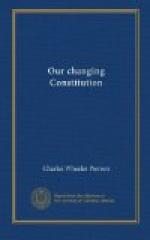It is not the purpose of this chapter to discuss the questions of justice and expediency (as to which there is much to be said on both sides) but rather to deal with the strictly legal aspects of the matter and indicate briefly why such a tax cannot be laid without a change in our fundamental law.
Let it be said at the outset that no express provision of the United States Constitution forbids. On the contrary, that instrument confers on Congress the power to lay taxes without any restriction or limitation save that exports shall not be taxed, that duties, imposts, and excises shall be uniform throughout the United States, and that direct taxes must be apportioned among the states in proportion to population. The obstacle lies rather in an implied limitation inherent in our dual system of government and formulated in decisions of the Supreme Court.
The founders of this republic established a form of government wherein the states, though subordinate to the Federal Government in all matters within its jurisdiction, nevertheless remained distinct bodies politic, each one supreme in its own sphere. In the famous phrase of Salmon P. Chase, pronouncing judgment as Chief Justice of the Supreme Court[1]:
The Constitution in
all its provisions looks to an
indestructible Union,
composed of indestructible states.
[Footnote 1: Texas v. White, 7 Wall., 700, 725.]
In a later case[1] another eminent justice (Samuel Nelson of New York) put the matter thus:
The General Government, and the states, although both exist within the same territorial limits, are separate and distinct sovereignties, acting separately and independently of each other, within their respective spheres. The former, in its appropriate sphere, is supreme; but the states within the limits of their powers not granted, or, in the language of the 10th Amendment, “reserved”, are as independent of the General Government as that government within its sphere is independent of the states.
[Footnote 1: The Collector v. Day, 11 Wall., 113, 124.]
It follows that the two governments, national and state, must each exercise its powers so as not to interfere with the free and full exercise by the other of its powers. To do otherwise would be contrary to the fundamental compact embodied in the Constitution—in other words, it would be unconstitutional.
This proposition was affirmed at an early day by Chief Justice John Marshall in the great case of McCulloch vs. The State of Maryland,[1] which involved the attempt of a state to tax the operations of a national bank. That case is one of the landmarks of American constitutional law. While it did not expressly decide that the Federal Government could not tax a state instrumentality but only the converse, i.e., that a state could not tax an instrumentality of the nation, the Court has held in many subsequent




